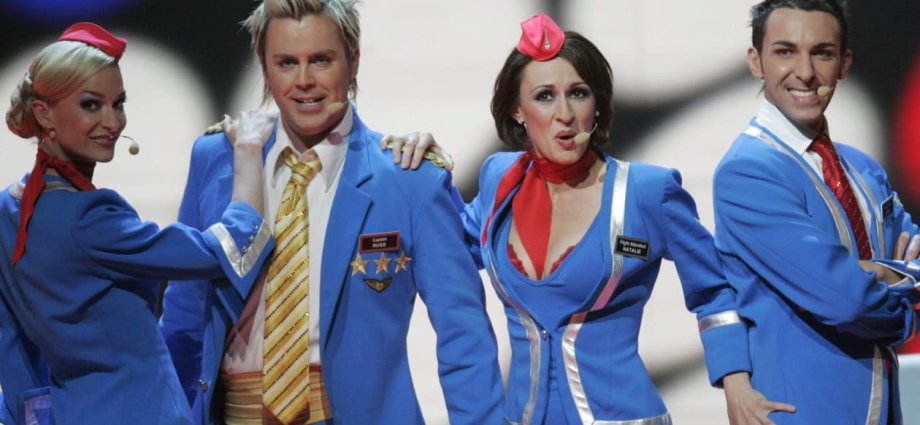Twenty-six acts will perform at Saturday’s Eurovision Song Contest final in Liverpool to an expected global audience of 160 million viewers.
With an entry from Austria that sees the singers possessed by the spirit of gothic American writer Edgar Allan Poe and an Australian five-piece band fronted by an immigration lawyer, this year does not lack for characters.
But it will have to go some to out-weird some of the contest’s most eccentric performances from years gone by. Here are some of the most infamous.
Sophie & Magaly
Luxembourg’s entry in 1980 featured French identical twin sisters Sophie and Magaly in “bright, triangular” tuxedos, “accompanied by a tall man who waddles around onstage in a large sequin penguin costume”, said Vulture.
The curious track set the tone for future years of Eurovision eccentricity. Entries “sometimes waver between bleeding-heart power ballads and eager dance tunes”, said the entertainment news site, “but this one is silly just for the sake of it, advancing an attitude that would inform countless playful and memorable entries from the decades to come”.
Buranovskiye Babushki
Anyone tuning into the 2012 contest in Baku “would have thought they’d slipped into some cheese-induced fever dream” when the Russian act appeared, said Indy100.
“In all the decades of Eurovision, it was (not unsurprisingly) the first time a group of grannies performed a demonstration of live baking”, recalled the news site, “and the sight of the elderly women boogying to their truly bizarre song Everybody Dance was a sight we won’t forget in a hurry”.
Jemini
This UK entry for the 2003 event in Latvia “suffered the ignominy of finishing dead last with zero points”, said The Irish Post. “Horribly off-key from the start, Chris Cromby and Gemma Abbey claimed they were unable to hear their backing track, resulting in the memorably awful performance.”
The iconic Eurovision host, Terry Wogan, suggested that perhaps the UK scored poorly because of a “post-Iraq backlash”, but “he was being too nice”, said The Irish Post.
Lordi
The Finnish act’s “Slipknot-esque performance shocked the competition into life” in Athens in 2006, said Indy100, because “everything from the singer’s falsetto vocals to the masks and the enormous, demonic wings which unfurled towards the end of the performance was deeply weird”.
The band managed to “upend pop’s traditional dominance”, said The Times, and “that they did it while looking like Freddy Krueger’s long-lost relatives, terrifying children around the world in the process, was quite an achievement”.
Scooch
The UK got it “iconically wrong” in Helsinki in 2007 with Scooch, the “Tesco Value Steps”, said NME. The group’s “airline-themed banger Flying the Flag (For You) was packed with end-of-the-pier double entendres that failed to land anywhere outside of Ireland and Malta, the only two countries to award it points”, said the music site.
It added that “it’s still wild to recall that it actually features the lyric: “Would you like something to suck on for landing, sir?” But “to be fair to them, they were holding a sweet”, said The Guardian.
Verka Serduchka
In the 2008 contest in Belgrade, the Ukrainian act “had it all: never-ending key changes, costumes that looked as if they were made out of tinfoil, double entendres (including a 69 printed on Verka’s outfit), several accordions”, said The Guardian, and “one hell of a controversy” because one of the lyrics “sounded very much like the words ‘Russia, goodbye’”.
Dustin the Turkey
Ireland has enjoyed a fine record in the competition but this 2008 entry was an exception. “Give us another chance, we’re sorry for ‘Riverdance’,” went one of the lyrics.
Few were in a forgiving mood. “When watching this performance,” said Virgin Radio, “you wouldn’t be blamed for thinking you had walked into a fever dream as the song was performed by a puppet turkey behind DJ decks surrounded by dancers dressed in feather boas.”
“Dustin was the siren warning of our impending doom,” said The Irish Times. “A few months later the economy collapsed and the IMF was on the way.”











